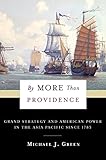By More Than Providence : Grand Strategy and American Power in the Asia Pacific Since 1783 / Michael Green.
Material type: TextSeries: A Nancy Bernkopf Tucker and Warren I. Cohen Book on American-East Asian RelationsPublisher: New York, NY : Columbia University Press, [2017]Copyright date: ©2017Description: 1 online resource (760 p.) : 27 maps and photographsContent type:
TextSeries: A Nancy Bernkopf Tucker and Warren I. Cohen Book on American-East Asian RelationsPublisher: New York, NY : Columbia University Press, [2017]Copyright date: ©2017Description: 1 online resource (760 p.) : 27 maps and photographsContent type: - 9780231180429
- 9780231542722
- 327.7305 23
- DU30 .G73 2017
- DU30 .G73 2017
- online - DeGruyter
- Issued also in print.
| Item type | Current library | Call number | URL | Status | Notes | Barcode | |
|---|---|---|---|---|---|---|---|
 eBook
eBook
|
Biblioteca "Angelicum" Pont. Univ. S.Tommaso d'Aquino Nuvola online | online - DeGruyter (Browse shelf(Opens below)) | Online access | Not for loan (Accesso limitato) | Accesso per gli utenti autorizzati / Access for authorized users | (dgr)9780231542722 |
Browsing Biblioteca "Angelicum" Pont. Univ. S.Tommaso d'Aquino shelves, Shelving location: Nuvola online Close shelf browser (Hides shelf browser)

|

|

|

|

|

|

|
||
| online - DeGruyter Trash Cinema : The Lure of the Low / | online - DeGruyter Pier Paolo Pasolini : Performing Authorship / | online - DeGruyter Sibling Action : The Genealogical Structure of Modernity / / | online - DeGruyter By More Than Providence : Grand Strategy and American Power in the Asia Pacific Since 1783 / | online - DeGruyter Narrative and Numbers : The Value of Stories in Business / | online - DeGruyter Love Letters from Golok : A Tantric Couple in Modern Tibet / | online - DeGruyter Bachelor Japanists : Japanese Aesthetics and Western Masculinities / |
Frontmatter -- CONTENTS -- NOTE ON KOREAN, CHINESE , AND JAPANESE TERMS -- ACKNOWLEDGMENTS -- INTRODUCTION -- PART ONE THE RISE OF THE UNITED STATES -- 1. "A Theatre for the Exercise of the Most Ambitious Intellect": Seeds of Strategy, 1784-1860 -- 2. "How Sublime the Pacific Part Assigned to Us": Precursors to Expansion, 1861-1898 -- 3. "I Wish to See the United States the Dominant Power on the Shores of the Pacific": Grand Strategy in the Era of Theodore Roosevelt -- PART TWO THE RISE OF JAPAN -- 4. "Leave the Door Open, Rehabilitate China, and Satisfy Japan": Defining the Open Door, 1909-1927 -- 5. "Between Non- resistance and Coercion": The Open Door Closes, 1928-1941 -- 6. "We Have Got to Dominate the Pacific": Grand Strategy and the War Against Japan -- PART THREE THE RISE OF THE SOVIETS -- 7. "The Overall Effect Is to Enlarge Our Strategic Frontier": Defining Containment in the Pacific, 1945-1960 -- 8. "Anyone Who Isn't Confused Really Doesn't Understand the Situation": Asia Strategy and Escalation in Vietnam, 1961-1968 -- 9. "An Even Balance": Nixon and Kissinger's Redefinition of Containment in Asia, 1969-1975 -- 10. "The President Cannot Make Any Weak Moves": Jimmy Carter and the Return of the China Card, 1977-1980 -- 11. "To Contain and Over Time Reverse": Ronald Reagan, 1980-1989 -- PART FOUR THE RISE OF CHINA -- 12. "The Key to Our Security and Our Prosperity Lies in the Vitality of Those Relationships": George H. W. Bush and the Unipolar Moment, 1989-1992 -- 13. "Engage and Balance": Bill Clinton and the Unexpected Return of Great- Power Politics -- 14. "A Balance of Power That Favors Freedom": Strategic Surprise and the Asia Policy of George W. Bush -- 15. "The Pivot": Barack Obama and the Struggle to Rebalance to Asia -- Conclusion: The Historical Case for Asia Strategy -- Notes -- Index
restricted access online access with authorization star
http://purl.org/coar/access_right/c_16ec
Soon after the American Revolution, ?certain of the founders began to recognize the strategic significance of Asia and the Pacific and the vast material and cultural resources at stake there. Over the coming generations, the United States continued to ask how best to expand trade with the region and whether to partner with China, at the center of the continent, or Japan, looking toward the Pacific. Where should the United States draw its defensive line, and how should it export democratic principles? In a history that spans the eighteenth century to the present, Michael J. Green follows the development of U.S. strategic thinking toward East Asia, identifying recurring themes in American statecraft that reflect the nation's political philosophy and material realities.Drawing on archives, interviews, and his own experience in the Pentagon and White House, Green finds one overarching concern driving U.S. policy toward East Asia: a fear that a rival power might use the Pacific to isolate and threaten the United States and prevent the ocean from becoming a conduit for the westward free flow of trade, values, and forward defense. By More Than Providence works through these problems from the perspective of history's major strategists and statesmen, from Thomas Jefferson to Alfred Thayer Mahan and Henry Kissinger. It records the fate of their ideas as they collided with the realities of the Far East and adds clarity to America's stakes in the region, especially when compared with those of Europe and the Middle East.
Issued also in print.
Mode of access: Internet via World Wide Web.
In English.
Description based on online resource; title from PDF title page (publisher's Web site, viewed 02. Mrz 2022)


